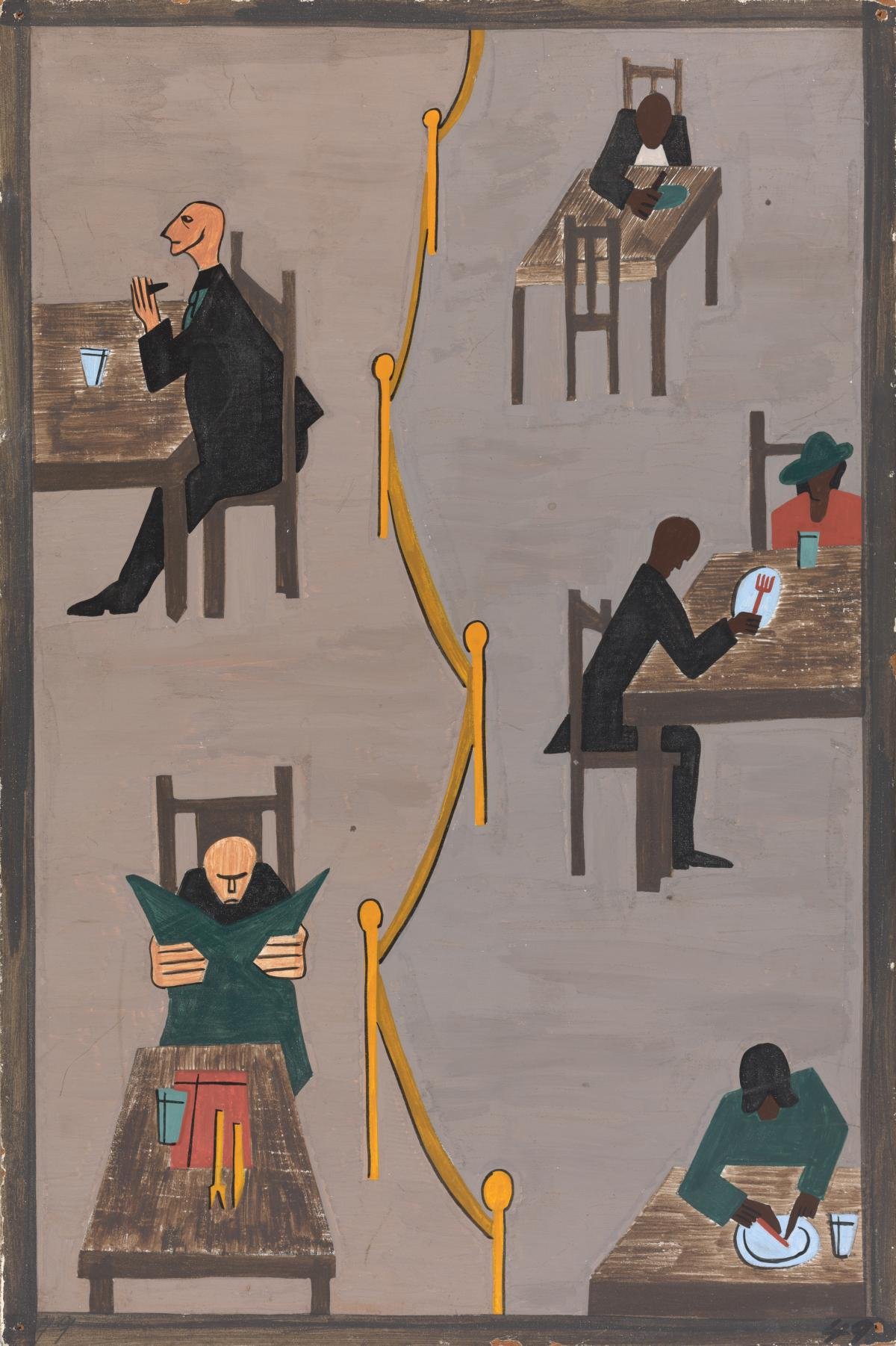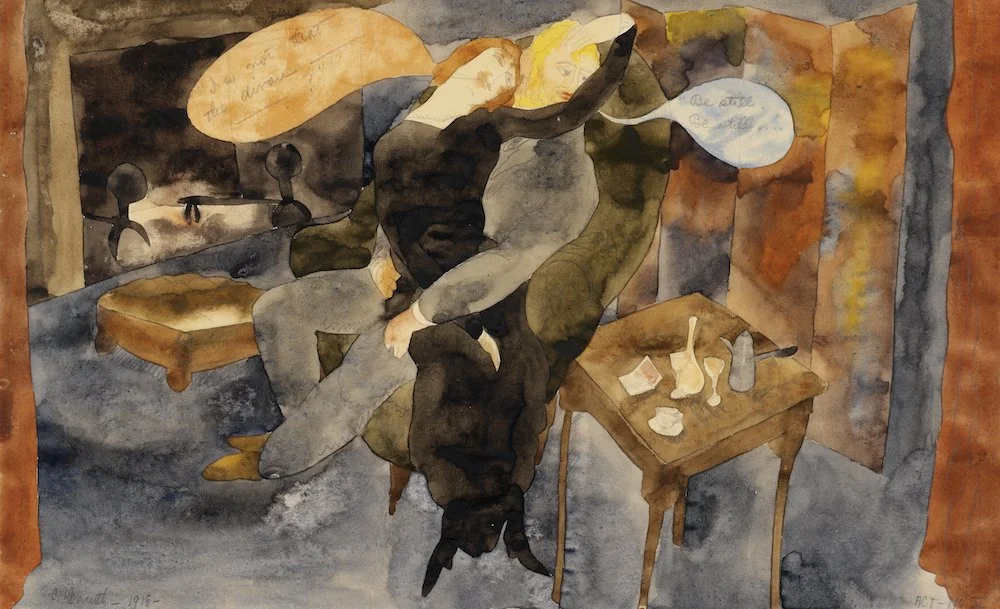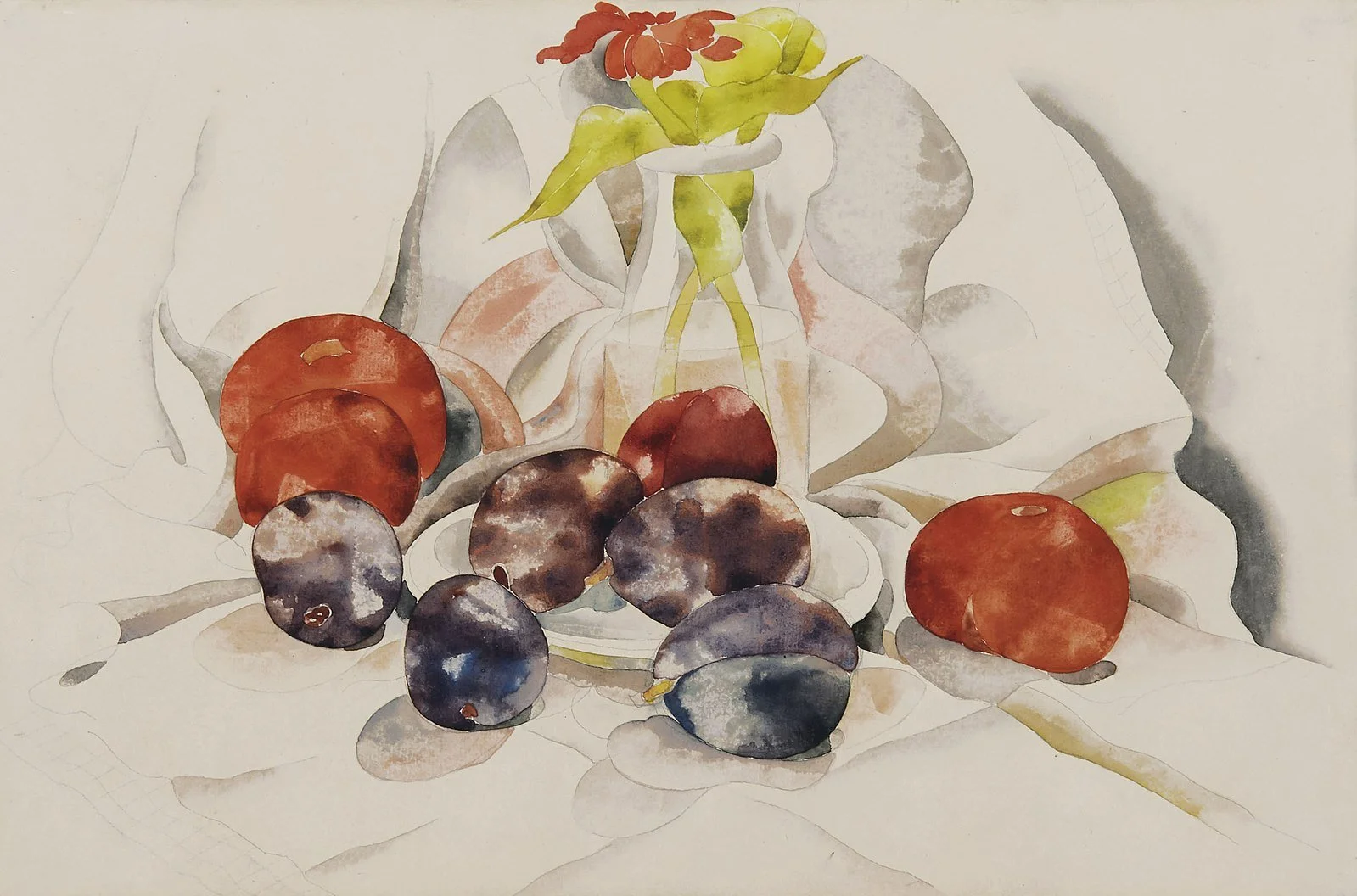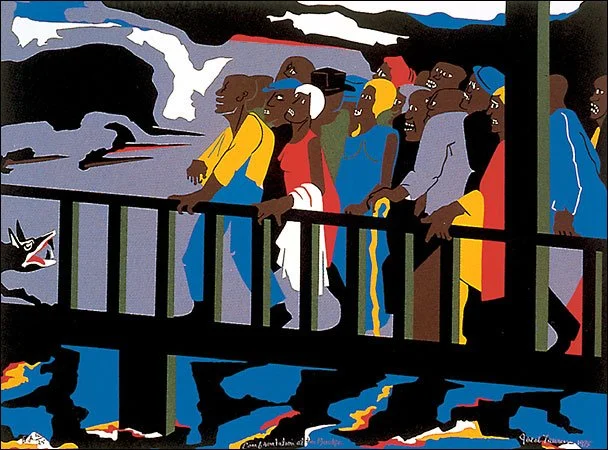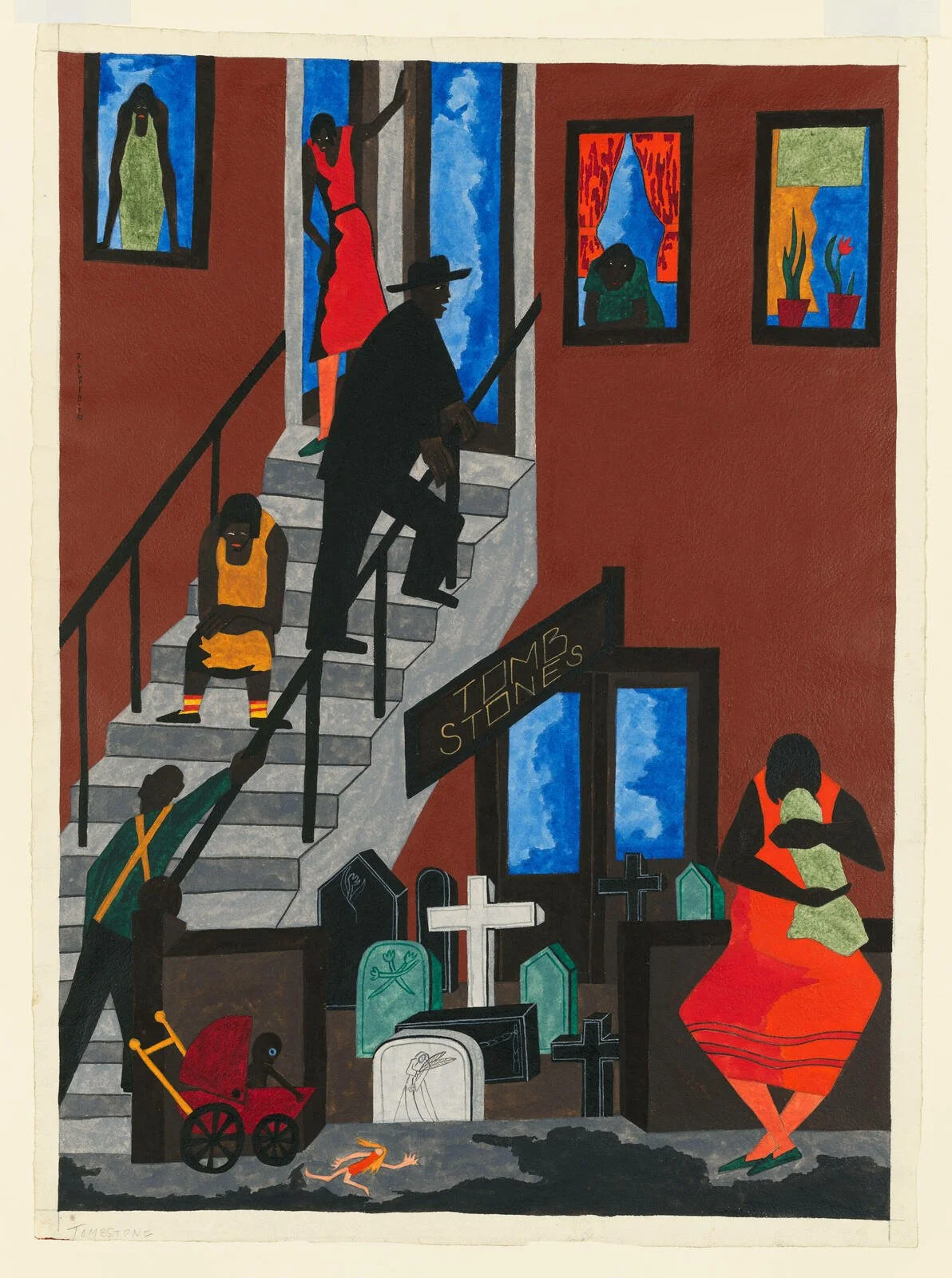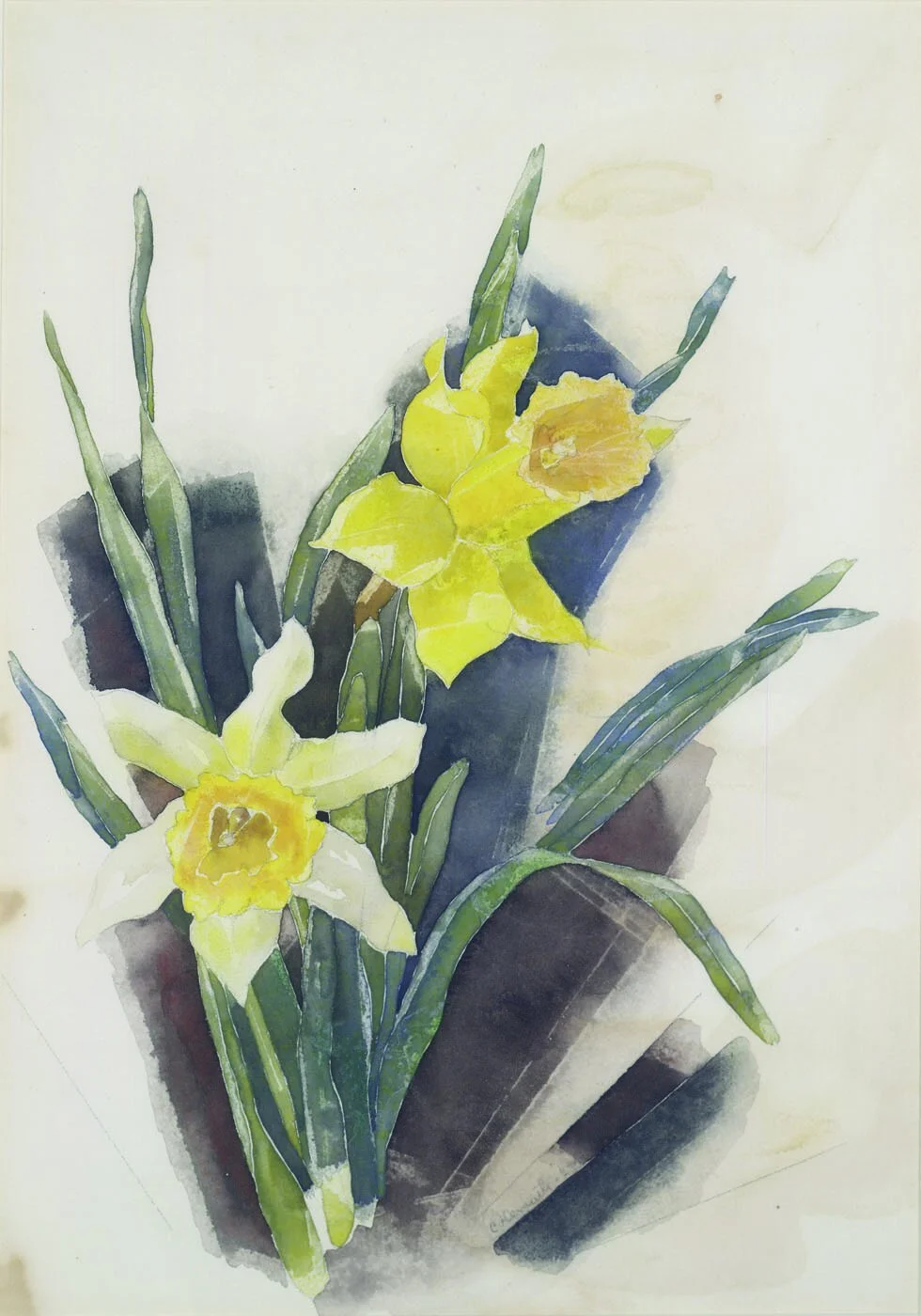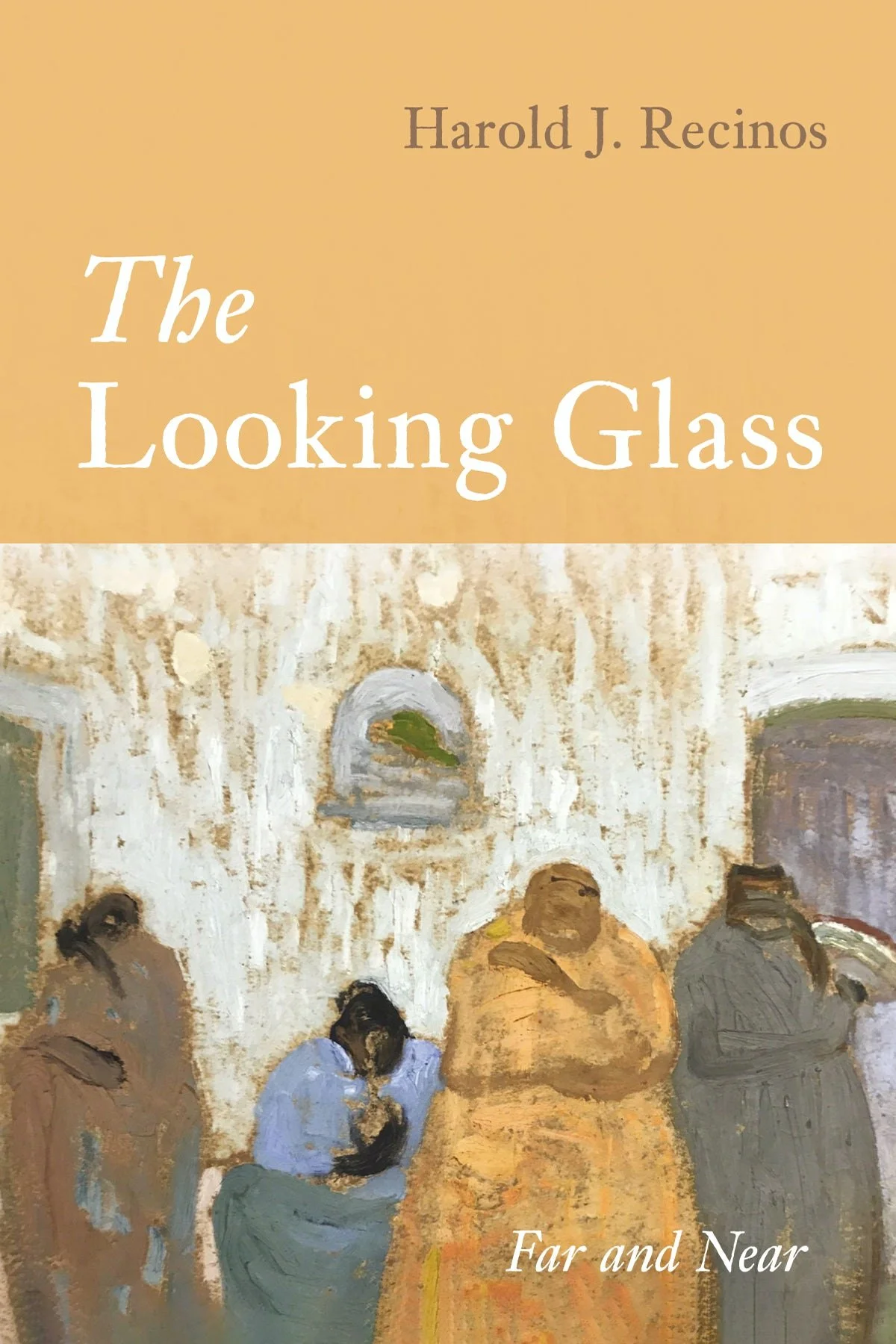Far and Near
Rev. Dr. Harold J. Recinos presents excerpts from his latest collection of poetry The Looking Glass
The Library (1960) by Jacob Lawrence. Tempera on fiberboard, 24 x 29 7⁄8 in. “Jacob Lawrence researched many of his paintings of African American events by reading history books and novels…[The] standing figure in the front looking at African art may represent the artist as a young man, delving deeper into his heritage.” Image and caption source: Smithsonian American Art Museum, Gift of S.C. Johnson & Son, Inc., 1969.47.24
HTI Open Plaza kicks off National Poetry Month with ten poems by Rev. Dr. Harold J. Recinos from his latest collection The Looking Glass: Far and Near (2023), excerpts of which are used here by permission of Wipf and Stock Publishers. The poems in this feature are paired with works by Charles Demuth and by Jacob Lawrence—artists who collaborated with Rev. Dr. Recinos’ favorite poets, William Carlos Williams and Langston Hughes, respectively.
POET’S NOTE
Many years ago, I was moved by the identities of two poets whose works about life on the hyphen is familiar cultural terrain to me. One of these beloved poets is William Carlos Williams, a pediatrician, an author and a friend of Ezra Pound. Although Williams wrote in English, his first language was Spanish, and he had a plural cultural background. His mother was of French extraction and born in Puerto Rico; his father was born in England and raised in the Dominican Republic. I discovered Williams in the seventh grade, along with another well-traveled poet who has influenced me a great deal: Langston Hughes. My own poems issue forth from a life on the hyphen that began in the South Bronx. I pray that my work inspires readers to think differently about what counts for knowledge and to come open to the unexpected rewards offered by the barrio.
—Rev. Dr. Harold J. Recinos
Simplicity
I recall a time when life was
simple, knotless, uncomplicated
and occupied by hopscotch, round
up tag, stick ball on the street
and subway rides to Manhattan
for the hell of it. the first day
of the public-school week never
failed to find its way to Friday
when most of the block kids found
themselves in Margarita’s apartment
for a little night of salsa
and floating dreams.
where did that simplicity
come from, perhaps the candles left
burning by mothers
in the local Catholic
church, charms from the Ponce Botánica
worn around our skinny necks, stories
from Spanish lands holding us by the
hand to prevent shattering or the long
conversations with the old men of the
block who made us laugh. I recall days
when we were free of the fallacies of
modernity, the distortions of detestable
politics, nights were spent on the roof
top, looking at the moon exhaling silvery
light and feelings of consolation were
abundant.
The Visitors (1959) by Jacob Lawrence, many of whose works are about the lives of ordinary Americans. Tempera on gessoed panel. Source: Dallas Museum of Art, General Acquisitions Fund
Latino at Seminary
in the seminary rotunda behind
a desk, to receive visitors entering
the hall from windy Broadway, they
come in with looks on their faces
of finding strength to believe in the
latest sediment of divinity in the
freshest theology taught. a little
ray of sunlight creaks into the space
while the sublime face of the janitor
from Guatemala smiles and shows a
gold tooth he got one migrant season
of a more youthful year. all day long
people eager to quench a thirst for
meaning enter the school believing
they will flourish in the sight of so
many fashionable religious scholars
and no one pauses to recall that the
building janitors who came from a
place pommeled by wars paid for by
citizens’ taxes too are made from the
dust of the earth. the chapel adorned
with belief that does not name days of
terror or believes the cross is a lynching
tree gathers visitors in time for praise,
while René makes his way to trash cans
in the Quadrangle to empty them.
The Migration Series, Panel No. 49: They Found Discrimination In The North. It Was A Different Kind (1940-41) by Jacob Lawrence. Casein tempera on hardboard; 18 x 12 in. Acquired 1942; © 2022 The Jacob and Gwendolyn Knight Lawrence Foundation, Seattle / Artists Rights Society (ARS), New York. Source: The Phillips Collection
The Riddle
I was called to Washington Square
Park to read to a friend who went
blind in late life from the book by
Gabriel Garcia Marquez, Love in
a Time of Cholera. she loved this
story about romance that unfolded
over decades, with talk of aging, the
scent of bitter almonds, the fate of
unrequited love, and the dream held
by two of winning each other back.
the love story was for her a great
companion for conversations about
the beauty of crescent moons, the
chances young lovers strolling in
the park had to find happiness, and
the sound of laughter. I can tell you
she wore blindness like a magnificent
pair of pearl earrings, roamed the park
without mourning light, and listened to
me read her favorite author. now and then,
I would look at her sightless brown eyes,
leaning into her answer to the riddle of
love in a time of illness.
Lula And Alva Schön (1918) by Charles Demuth. Watercolor and graphite on wove paper; 8 x 13 in. Source: The Barnes Foundation
Fruit And Flower (ca. 1925) by Charles Demuth. Watercolor and pencil on paper; 12 x 18 in. Source: Christie’s
The Confirmation
I was looking at the fruit
dangling in the color green
from a mango tree and saw
parakeets nesting on their
secret spot waiting perhaps
for a sky full of stars. we
spent the afternoon with all
the ghosts who shouted on
the streets and went to war
to protest suffering, the elders
who had seen too much, the
peasants with permanently
blistered hands, the widows
and children standing tall in
divine light. we gathered at
the edges of the city to wait
for the patient stories from
the familiar margins, curse
evil at its core wherever it
takes possession of human
bodies and to revel beside the
mango tree with witnesses
who rehearsed with accurate
memories the messages that
give us life, even while tears
try their best to hold up the
messy world.
Confrontation at the Bridge from the series Not Songs of Loyalty Alone: The Struggle for Personal Freedom (1975) by Jacob Lawrence. Screenprint; 49.5 x 66 cm. Commissioned in honor of the United States' bicentennial in 1976, the work depicts a 1965 march on the Edmund Pettus Bridge in Selma, AL by unarmed protesters objecting to the denial of African Americans' right to vote. Two days later, Martin Luther King Jr. led 25,000 marchers to Montgomery. ©Jacob Lawrence © Fair Use. Source: WikiArt
The Small City
after the little ones’ flesh
turns toward the dust, what is
left of them, will heavenly
gates open for them, and will
Angelic voices come to earth
to offer comfort to the families
whose children were mowed down
by bullets from a demon’s rifle that
obliterated every innocent dream.
yes, these beautiful lives mattered,
they had real magic in this divided
world, laughter for the sweet hours
after school and fresh sentences with
words often uttered in Spanglish that
carried mothers into the quiet hours
of night. yes, they were loved by people
striving for a better life and who have been
left with loud wailing in a near border town
of the land of the free and brave that
will hardly think twice about them. yes,
night in the small city will never end for
those exiled from light.
The Bible
before reading your
reverse standard Bible
that tells you another
story of a God who puts
out the lights, I want to
remind you the dead
like feathers are carried
to the places your faith
ignores. you dear servants
who read false words and
plead ignorance of the cries
on this noisy earth should
know the God you never
find in the book you prize
remembers every name
you despise. in the beautiful
world sustained by approving
love and unsteady worldly
kindness, God dropped in to
give us the light you never
held, fool! remember this
when you have your next
confused Bible-reading hour
to make foul interpretations
that never disclose the guiding
star of Bethlehem.
Incense of a New Church (1921) by Charles Demuth. Oil on canvas. Source: WikiArt
When I Think of Them
they heard the frightened voices
of children on 911 calls, like the
kids some of them would go home
to hug, and they let the minutes tick
away, with their special smell of the
burning of hell. they waited longer
than all the shots fired, dressed in
fresh uniforms with shiny badges,
ready to punish devastated parents
in the name of a police code too
dark for the innocent inside of the
school building to survive. we are
left thinking about all the loss, the
classrooms where blood was spilled,
with bodies beyond recognition that
will remain ripe with decay longer
than life itself. we have counted the
tiny broken bodies, the spots of God
left in an elementary-school prayer
cannot make whole. we rage at the
end of life for those with too little
experience to measure and the coffins
receiving them. at each graveside, we
stare at the sheltering earth that weeps
about the gun violence moving across
her sacred body.
Childhood Sketchbook Pages (n.d.) by Charles Demuth. Opaque paint on paper; 8 1/2 x 10 3/4 in. Source: Gift of Salander-O’Reilly Gallery, Demuth Museum Collection
Meditation
they asked him once in
the barrio how his life is
joined to history at the edges
of the city and the eyes on the
block no longer able to hold
tears. they held his calloused
hands in church to pray, his
tongue did not move, and his
thoughts were occupied by
the impossibility of salvation.
they wanted to know what it
felt like to hold a teen boy who
walked all night to reach him
to die in his arms. he said time
had become wordless sadness
and, like hoarse water, swallowed
under a frightening sky. I always
run into him sitting on the stoop
waiting for something, looking up
and down the street, sometimes even
up at heaven, searching, I think, for
signs of chariots swinging low.
Tombstones (1942) by Jacob Lawrence. Opaque watercolor on paper; 30 7/8 × 22 13/16 in. The painting “encapsulates the full sweep of life within the African American community, from the cradle—the baby carriage at left, the Madonna-like mother and child at right—to the grave, marked at center by the tombstone seller’s wares.” Image and quote source: Whitney Museum of American Art
Anno Domini
the new year is already
inviting me to have blind
faith in new life, to let the
paid theologians ask about
the existence of God, not
to see grey clouds covering
light, to dispatch flowers to
graves and listen closely to
songs inspired by the very
first manger. to tell the truth, I
expect God not to live elsewhere
next year, to find time to talk at
length to poor single mothers,
border-crossing refugees, and
homeless migrant kids. in the
new year, I would like to hear
less about the purity and gentleness
of the first-century Jew lynched on
a tree and to notice more confessional
types with hearts to feel, and sorrow
in their eyes finding the dark-colored
Galilean in brothers and sisters of the
same hue who never hesitate to take
a stand against hate, the opiate church
and the instinct to save oneself. in the
coming days, I hope we can love God in
the very flesh sacred literature says
is varied and good.
Club Q
beloved, afraid of living on these
shores for unapologetically loving
those who place a kiss on your cheek.
despised by bigots who know nothing
of the embracing heart of God, you are
the rushing waters of the river that takes
us to peek into another land that rejects
the self-righteous, errant theologians, and
hateful killers who loathe the beauty in you,
divinity made. tomorrow, those who live in
places that wait for sudden and unexpected
messages from a heaven that balances all
kinds of love will sit with you at the same
banquet table, finding in the lush talk around
it every rainbow dream that from the beginning
offered this divided world the most marvelous
things. let us chase the monsters who point the
barrels of their guns into hell and declare that
love is what saves this world and all of us now
in this time of grieving.
Daffodils (date illegible) by Charles Demuth. Watercolor and graphite on paper; 13 3/8 x 9 3/8 in. Source: Demuth Museum
The Looking Glass: Far and Near (Wipf and Stock Publishers, 2023) by Harold J. Recinos
“In this collection of poetry, Harold Recinos inhabits the world of those that live on the edge of society, the migrants that cross rivers at nighttime to find refuge in a land that often turns them back. Recinos speaks of the inherent racism that people—Brown people, women, emigrants—experience in America, and he does it with extraordinary depth and beauty. This is an extraordinary collection of poems that will break your heart and inspire change in our fragmented world.”
—Marjorie Agosin
Author of the Pura Belpré Award–winning I Lived on Butterfly Hill



